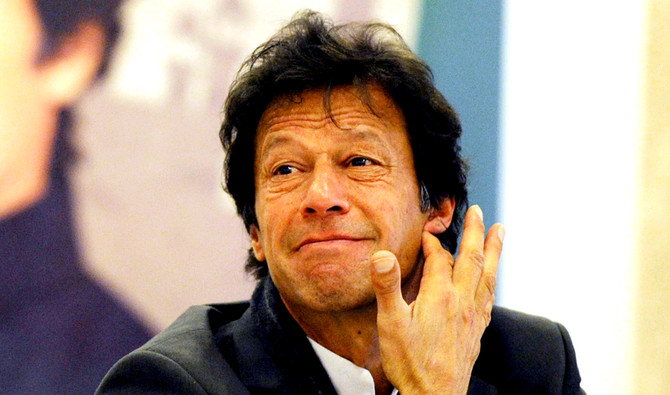- Imran Khan’s party has 158 seats in a 342-member National Assembly – short of 14 members to prove simple majority
- Opposition parties vow to give tough time to “puppet government” through protests inside and outside parliament
ISLAMABAD: Pakistan’s prime minister-in-waiting Imran Khan’s Pakistan Tehreek-e-Insaf (PTI) and opposition parties are struggling to consolidate their position before the National Assembly’s inaugural session on Monday, in which all elected members will take oath of their seats.
Election for the coveted slots of Speaker, Deputy Speaker and Prime Minister will take place in the coming days.
All the parliamentary parties are jostling for a show of strength to fill these slots through election in the House.
The PTI leadership has been trying to build a coalition for the federal government since the July 25 polls as the party failed to win a simple majority to form the government. The party has now mustered enough numbers in the National Assembly to elect Khan as premier, but formation of an impressive cabinet and economic team still remains a challenge for it.
According to the Election Commission of Pakistan, the PTI has emerged as the largest party with 158 seats in a 342-member National Assembly – but is still short of 14 members to prove its majority in the House.
In the next five years to retain a simple majority in the Lower House of the Parliament and counter any move of a joint opposition, the PTI will remain dependent on its seven allied partners – Muttahida Qaumi Movement-Pakistan, the Pakistan Muslim League, the Balochistan National Party, the Balochistan Awami Party, the Grand Democratic Alliance, the Awami Muslim League and the Jamhoori Wattan Party.
All the seven allied parties of the PTI collectively have 27 seats in the National Assembly, enough to support the ruling coalition to run its day-to-day functions smoothly, but only if they all refrain from creating troubles for the government.
The PTI has still not decided about the cabinet and economic teams.
The party has held several sessions of discussion and brainstorming for the past two weeks at the party chairman’s palatial residence in Islamabad, but they have yet to announce the cabinet members.
The party has, however, nominated a loyalist for position of chief minister Khyber Pakhtunkhwa province, where it has won a two-thirds majority in the elections.
Nominations for Speaker National Assembly and Governor Sindh have also been announced, but these announcements are least reflective of the party’s policy to run affairs of the state.
Azhar Laghari, head of the PTI’s public relations department, said that deliberations are still under way to fill key positions in public departments, including the cabinet members who will be responsible for improving the governance of their respective departments.
“Formation of the cabinet and a robust economic team are not less than a challenge for the party that is fully committed to set new precedents of good governance in Pakistan,” he told Arab News.
“Imran Khan is committed to appoint the best of the best people and all the nominations will be finalized and announced in the next couple of days,” he added.
Political analysts, however, say it is a test of Imran Khan’s leadership to have effective control of all the government functionaries and all those “electable candidates” of the party who won the polls on the PTI’s ticket.
“In parliamentary politics, it has never been easy for any party to run its functions smoothly, especially in a case when it does not enjoy even a simple majority in the House,” Professor Tahir Malik, political analyst and academic, told Arab News. “The PTI will have to develop a good working relationship with all parliamentary parties, including the opposition, to deliver on its election promises,” he added.
On the other hand, opposition parties including Pakistan Muslim League-Nawaz, the Pakistan People’s Party and Muttahida Majlis-e-Amal have also been finalizing their strategy to give, as per its claims, a tough time to the government inside and outside the parliament.
The PML-N, party of the jailed ex-premier Nawaz Sharif, has 82 seats in the National Assembly, followed by the PPP with 53 and the MMA with 15 seats. The opposition alliance comprising these parties has decided to file its joint candidates for speaker, deputy speaker and prime minister to face the PTI.
The alliance is, though, not in a position to win any of the coveted seats in the House because of its low numerical strength.
Senator Mushahidullah Khan, secretary information PML-N, said that all the opposition parties have united on a one-point agenda of protesting against the “rigged elections and a puppet government.”
“The opposition party’s alliance is committed to expose rigging in the polls through protest at all available forums,” he told Arab News. “We have no personal agenda but want to strengthen democracy in the country.”
Rasul Bukhsh Rais, political analyst, said that alliance of the opposition parties is temporary and they will not be able to createany major trouble for the government as long as the PTI keeps working along with its coalition partners.
“All parties in the opposition alliance have different ideological leanings and they have different interests in the political system,” he told Arab News. “The opposition alliance can make an impact only if it comes up with some viable suggestions to fix the system and improve governance.”

